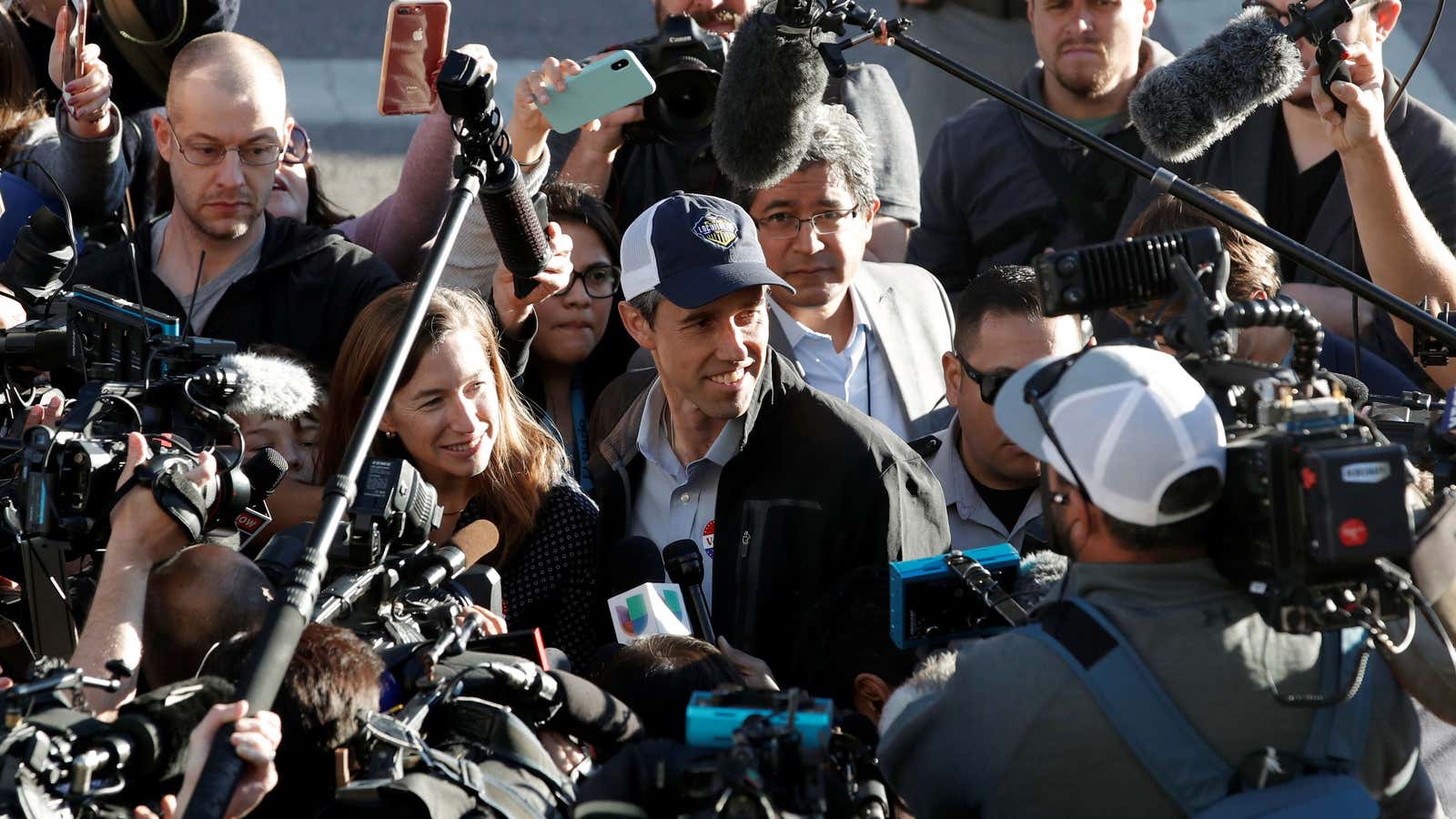For a longshot candidate in solidly Republican Texas, Democratic US representative Beto O’Rourke got astonishingly close to snatching a US senate seat for his party.
O’Rourke lost narrowly to Republican incumbent Ted Cruz after running an unconventional campaign that attracted an unprecedented number of voters, even in solidly Republican areas. Those gains could put Democrats much closer to their longstanding goal of turning Texas blue—a feat that would give their party a significant leg up in presidential elections.
But Beto, a former punk rocker from the political boondocks of El Paso, is himself an unconventional candidate. Texans will have to wait until the next election to see if others can reproduce the enthusiasm he generated both within the state and nationwide.
The long-awaited blue wave
Democrats have been predicting that demographic change in the Lone Star state will make them the dominant party—eventually. But so far, Texas’s brisk urban expansion and the swelling of its Latino community have failed to translate into enough votes to make Democrats competitive in the state. Democrats haven’t won a statewide office since 1994.
Even Donald Trump, who railed against Hispanic immigrants, won the state by a 9% margin. But the most recent Senate race was much closer. With about 60% of votes in, Cruz was beating O’Rourke by less than three percentage points.
Results were surprisingly tight in reliably red areas, such as Tarrant County, where Fort Worth sits. As the rest of Texas’s urban counties turned blue, Tarrant had remained stubbornly red. In 2016, it went for Trump by nearly the same margin as the rest of the state, 8.6 percentage points. Senator John Cornyn won by a much wider margin in the 2014 midterms: 61% vs. his Democratic opponent’s 38%. Preliminary results show Cruz and O’Rourke virtually neck-and-neck in the county.
The Democrat also widened margins in blue areas, such as Travis County, home of liberal Austin. There O’Rourke appears to have won by a landslide of more than 50 percentage points. Compare that to Hillary Clinton, who won Travis by less than 40 points.
Turning out nonvoters
O’Rourke focused early on voters who don’t frequently go to the polls or those who hadn’t ever voted, and early voting results suggest he succeeded. More Texans voted early than in the overall 2014 midterm elections; this year, turnout will likely rival that of the 2016 presidential election.
A large part of the increase was due to young voters and minorities, two groups that O’Rourke actively courted. Part of that strategy included registering them to vote. So even if enthusiasm dims, Democrats will be starting from a larger pool of voters.
That drive to get new voters was largely possible to record-setting amounts of cash his campaign raised from individual donors; O’Rourke vowed off money from political action committees. A big chunk of it came from out of state.
But the candidate’s perennial presence on social media—he broadcast his daily activities from sunrise to sundown—and his grassroots organizing no doubt also played a role.
Swinging Republicans
There are also signs that O’Rourke made inroads with some Republicans turned off by Donald Trump’s antics. The Dallas Morning News, which leans conservative, endorsed the Democratic candidate, saying he represented a needed return to civility. The same newspaper ran an op-ed by a self-designated pro-lifer who said she voted for O’Rourke because she was tired of seeing others in her movement compromise their own values “to elect a man thrice married, who bragged about his infidelities and predatory behavior.” Reporting elsewhere suggests she was not the only one.
Though he ran on some progressive issues, such as a single-payer healthcare system and legalizing marijuana, O’Rourke touted bipartisanship and unity. He also visited every county in the state, making multiple stops in suburban Republican enclaves that his predecessors deemed as lost causes.
“My faith in this state and this people as a country is in no way diminished at this moment,” an emotional O’Rourke said during his concession speech in El Paso. “I know we will continue to work to come together.”
“I’m so fucking proud of you guys,” he added.
It will take days to parse out the exact composition of the Beto coalition, but the results suggests there’s something to his pan-Texan strategy that might work again in the state—and elsewhere.
